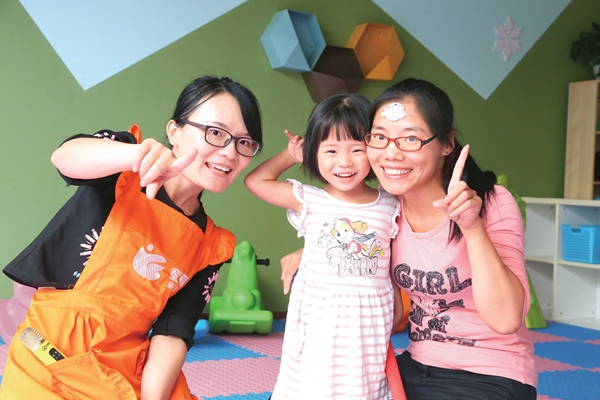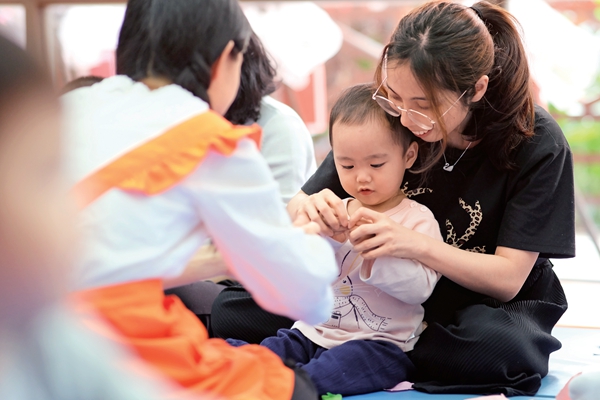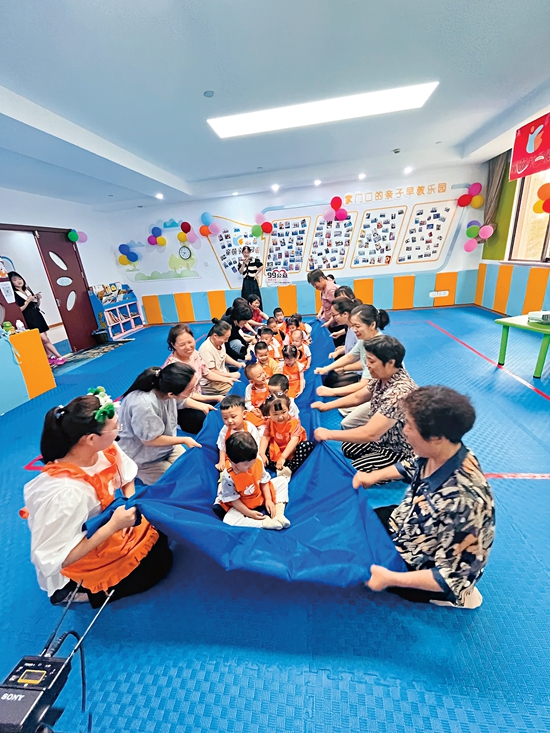Project | Early Education Services in Communities Benefit Families, Full-Time Mothers
Xi Jinping, General Secretary of the CPC Central Committee, also Chinese President and Chairman of the Central Military Commission, delivered an important speech during his talk with the new leadership of the ACWF, in October 2023. To study and implement the guiding principles of that speech, and to implement the guiding principles of the 13th National Women's Congress of China, the Human Resources Development Department and the Social Liaison, Exchanges and Cooperation Center, both under the ACWF, recently released the list of 50 projects, with characteristic features, organized by women's social organizations across the country, and the list of 10 cases, with characteristic features, of women's federations connecting with and guiding social organizations. Here is one of the projects.

Project: Jiayou Mothers — Supporting Women's Community-based, Early Education Businesses Project
Organizer: Chengdu Tongmeng Social Work Center
Young Chinese parents have been demanding wider access to high-quality early education in recent years. However, statistics indicate commercially oriented, early education services are expensive, and middle- and low-income urban families have limited access to early education services in China.
Mao Lei began paying attention to such topics after he and his wife had their first child. To help children obtain access to high-quality early education, and to get people involved in the development of community-based, early education services, in 2016 he founded Chengdu Tongmeng Social Work Center (Tongmeng), in Chengdu, capital of Southwest China's Sichuan Province.
Tongmeng has established a sustainable, and feasible, early education service model, which can be replicated anywhere.

Empowering Full-Time Mothers
"In 2018, to help full-time mothers find employment, we launched Jiayou Mothers — Supporting Women's Community-based Early Education Businesses Project. We hoped the project would empower full-time mothers, through professional early education training and sound career-promotion systems," Mao says.
Tongmeng has cooperated with government departments, people's organizations and communities, and it has made use of vacant public spaces in communities. It has employed full-time mothers –– who wanted to become employed or start their own businesses in the early education sector –– as teachers in the centers.
After they received training from Tongmeng, the mothers became its business partners, and they have since operated community-based, parent-child early education centers.
The centers provide families with convenient, affordable and high-quality services, and a portion of each center's revenues is used to support the sustainable development and governance of the community.
Tongmeng has created several training courses, to teach practical skills and information about children's physical and mental development, to full-time mothers who lack such background knowledge.
During preparations to open a parent-child center, Tongmeng provides comprehensive guidance, in terms of location selection, business promotion and student recruitment. It continues to provide professional support in teaching, marketing and management to ensure the center's smooth operation.
"If my child didn't study in a parent-child center under Tongmeng, I wouldn't have known the organization's professionalism in early education, and I wouldn't have had a chance to become a teacher in one of the centers," says Yang Sisi, a mother and center employee.
In 2020, Tongmeng rolled out its online-training platform, which attracted teachers and social workers, interested in early education, in various regions of China.
Li Ling, a former teacher with a Tongmeng parent-child center, said the training platform helped her adapt to her role as an early education teacher in a relatively short time. Li is now responsible for providing support to 50 teachers (all mothers) in 30 parent-child centers.

New Parenting Model
Each Tongmeng parent-child center provides free services for a certain amount of time (about 30 percent of its open hours). The price is much lower than the average price of similar service providers.
Mao recalled how Tongmeng heavily relied on public donations in the beginning, and how that made it difficult for the public-welfare services to enjoy long-term, sustainable development.
So, he decided to change Tongmeng's operational approach. The parent-child centers and Jiayou Mothers Project have provided low-priced, community-based early education services. As such, Tongmeng is able to maintain its operation with the money earned by the centers. At the same time, its services have met families' demand for early education in communities.
Parents have been encouraged to establish parenting groups, each one emphasizing self-service and mutual assistance.
As of June 2024, Jiayou Mothers Project was operational in 62 residential communities in Chengdu, and it had helped more than 100 full-time mothers either find employment or start businesses.
During the past three years, women who started their own parent-child centers under the project have reaped a combined 10 million yuan (US $1.4 million) in profits, and they have donated a combined one million yuan (US $140,845) to various community-based projects.
Each parent-child center is open to the public for more than 250 days a year, and each serves more than 200 families a combined 10,000 times a year.
Moreover, the project's service model has been promoted in several cities in Sichuan, and in 20 cities in 13 provinces, including Hebei, Jiangsu, Guangdong and Shaanxi.
"We will continuously operate Jiayou Mothers Project, and empower more women through our professional training and career promotion schemes," says Mao.
Photos from Interviewees
(Women of China English Monthly September 2024)
Editor: Wang Shasha
Please understand that womenofchina.cn,a non-profit, information-communication website, cannot reach every writer before using articles and images. For copyright issues, please contact us by emailing: website@womenofchina.cn. The articles published and opinions expressed on this website represent the opinions of writers and are not necessarily shared by womenofchina.cn.








.jpg)

 WeChat
WeChat Weibo
Weibo 京公网安备 11010102004314号
京公网安备 11010102004314号